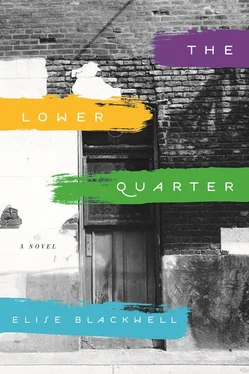“Frankly, between you and me,” he said, leaning in over the coffee drinks he had ordered and carried to their table, “between you and me, it’s more a matter of being downright difficult than merely high maintenance.”
Johanna was familiar with this move: a man seeking sympathy for being married to someone he had chosen to marry. It occurred to her that he might think she’d worn the blue dress — which was modest in its neckline but short enough to show her knees when she sat and made of a snug-fitting knit — because of him. She wasn’t above pursuing such men. Married men were usually easier to get rid of quickly. But not always, and then they were the biggest problem of all because they felt entitled to whatever it was they thought they were exploding their lives to obtain.
“You should tell her,” she said, “to use better materials for her work. She is very talented, and she knows what she should be using, so it seems intentionally self-defeating.”
The man jerked back as though this idea had really never occurred to him. “Maybe it gives her an excuse,” he said, “something to blame if her work fails. I doubt it’s conscious, though.”
Johanna shrugged. What the woman thought was not her concern. Only her actions mattered, and her action here was to take away some of her work. She wished she could drop the husband as a client, also.
“At any rate,” he went on, “I feel dreadful after you went to our house while we were out of the country and everything.”
“No good deed goes unpunished,” Johanna said, repeating as softly as she could another of the lines she had heard people at the Mojo Lounge use to describe similar situations.
“Of course I’ll pay you for all the work you’ve done.” He pulled out a wallet. “I need to finesse this a bit at home, so I hope cash is all right.”
Johanna shrugged again. Cash was fine, so long as he realized he was paying for nothing but the work she had performed. If he wanted to think of it as their secret, he could, but it was not a secret to her. What it did feel like was a waste of time; the man could have dropped the money off at her studio.
“Let me escort you back,” he said, standing quickly as soon as she pushed back her chair. “I can drive you. Or if you drove, I can ride with you and get a cab back up.”
“No, thank you,” she said, intentionally withholding an explanation or excuse why not. She owed him nothing.
“Can I call you?” he asked, his hands stuffed into the front pockets of his jeans, his expression like a catalog version of sincerity.
She gathered her cup and saucer to put in the self-busing tub by the door. “I’ll give you a call when your drawings are ready. Cash will be fine again — or whatever is easiest for you.”
She knew something was wrong as soon as she opened the door to her workshop. Nothing had changed that was visible to the naked eye, but still she knew. She had learned to trust her instincts, to believe in her subconscious interpretation of events. Perhaps she could see, without knowing that she could, disruptions in the patterns of dust. Perhaps there was some other way of her knowing, but someone had walked through her studio while she was out. She was certain.
Even though she was sure that whoever had entered had also left again, it did no harm to take extra precautions. She set her bag down on one of the worktables, slipped off her shoes, and extracted the small switchblade, which she tucked into the elastic between the two cups of her bra, and the small can of pepper spray, which she palmed before going upstairs, her index-finger pad on the spray button. The thought occurred to her that she should call Elizam, or that at the least she could call him, but this thought was painful, a contraction in her stomach. He had known about her meeting — that she would be away — and what was he, after all, but a thief?
A question for later, but once again an idea was reinforced: She was alone in the world, and that was good.
Upstairs her impression confirmed her earlier intuition. Someone had been inside her apartment, and he — surely it must be a he — was no longer there. Nothing was exactly out of place, but one sofa cushion sat higher than the other, as though it had been lifted and replaced. The bowl on her kitchen counter that held her mail and any odd object that needed a location before she decided to throw it away was a millimeter or so to the left of where it had sat before. She wasn’t an artist, but she knew perspective and composition better than many of the artists she had worked with. The bowl was definitely if ever so slightly wrong .
She went directly to the filing drawer of her desk and was relieved to see her few essential papers, including her lease and tax forms as well as the Social Security card Gerard Fontenot had arranged. He had arranged for the newer passport, too, though she had allowed it to expire bearing only the departure stamp from Belgium, the stamp in Amsterdam, where she and Clay had changed planes, and the entry stamp made in the Atlanta airport, where she’d changed planes a decade ago and caught the very last flight she had taken: the one that ended at Louis Armstrong airport. Since then, she’d never gone farther than a short drive. Even for the storm, she’d made it only as far as Arkansas, biding her time in Little Rock until she could point her van back toward New Orleans.
She looked next in the closet. The carefully wrapped painting — the only other thing she cared about aside from the documents that allowed her to continue her life — was gone. She tried to console herself with the fact that she had already resigned herself to relinquishing it, but it was worse that they hadn’t even let her have that bit of dignity. The meeting with Gerard had been a ruse, more or less, a way to get her out of her place. Instead of letting her give up the painting, they had taken it from her with no opportunity to see it one last time. She didn’t even have a photo of it, though she didn’t need one. She would remember its every detail for the rest of her life.
Next she interrogated the word they . Surely Gerard Fontenot comprised it, and the man she wanted dead most in the world. For them she felt hatred, black and heavy and hot. But the other likely member of the they , the one who would have the dirty hands of actual work — for him she felt something else. Betrayal was the only word she could attach to it, but it was insufficient.
She sat on the sofa, rocking her torso gently, and cried.
Clay
Clay drove one of his father’s cars to the Lower Quarter, where his knock on Johanna’s locked door went unanswered. To kill time while waiting for her to return, he skulked around the block and peered through the crack in the gate behind the old Ursuline Convent. The convent had stood since 1725 and had never been left empty until Katrina, its nuns sticking out the wars and yellow-fever epidemics that had come to their new city. But in August they — women in their sixties, seventies, eighties — had left by boat when the floodwaters rose. The roof had sustained serious damage, Clay had read, but the sisters were returning a few at a time.
November occupied their gardens, which had been cleaned up after the storm but were now austere rows of hedges. The statues of praying nuns and one monk were arranged in a V. Each looked toward the sky, and Clay imagined them looking into the eye of a hurricane rather than beholding the face of their God.
He tried knocking again, loud enough to be heard upstairs, and then calling, though Johanna almost never picked up when he phoned. He crossed Decatur to the bar across the street and ordered a beer.
“Saw you knocking across the street.” The bartender looked and sounded like a Cajun, but he was on the tall side if that was true.
Читать дальше












